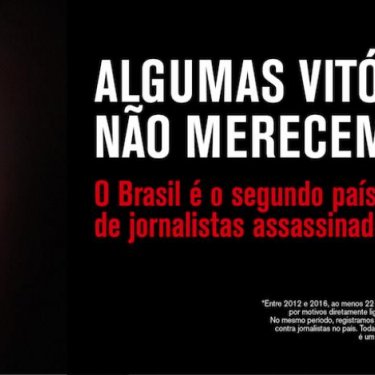Violence against the media in Brazil: 5 emblematic cases

As part of its “Some wins don’t deserve a medal” campaign, Reporters Without Borders (RSF) is looking back at the cases of Brazilian journalists who were killed in recent years just for doing their job, cases that serve as a reminder of the essential role played by the media in this still young democracy, a country marked by corruption and violence.
Launched on 4 August by RSF’s Rio de Janeiro-based Latin America desk to coincide with the start of the Rio Summer Olympics, the campaign aims to draw the international community’s attention to the dangers and violence that media personnel still face in Brazil, and to the lack of consideration for the precarious situation of many journalists, especially those who are not working for the leading media groups and those working outside the major cities.
No fewer than 22 Brazilian journalists have been killed because of their work since the last Summer Olympics in 2012. This means that Brazil holds the title of Latin America’s second deadliest country for media personnel, after Mexico.
RSF has focused on a few of these 22 cases because they illustrate the different kinds of dangers that reporters, bloggers, radio programme hosts and other journalists may face in Brazil and the urgency of finding effective protection and alert mechanisms.
Their deaths must not be forgotten because their stories highlight the important role played by journalists – especially investigative journalists and those who are brave enough to denounce the stark realities around them – in shedding light on the truth and helping to combat corruption and organized crime.
Gleydson Carvalho (1982-2015)

Gleydson Carvalho was a radio presenter for Radio Liberdade FM 90.3 in Camocim, a town in the northeastern state of Ceará. Two men with pistols stormed into the radio station on 6 August 2015 and one of them shot Carvalho several times during a musical interlude in the middle of his programme. They then fled on a motorcycle. Carvalho died a few minutes later while being rushed to hospital. He had been denouncing political corruption in Ceará for years and had received many death threats, which he had reported to the authorities.
The seven people taken in for questioning in the course of the investigation included the uncle and nephew of the prefect of the neighbouring town on Martinopole. Three people have been arrested pending trial – the suspected hit men and the alleged instigator.
Evany José Metzker (1948-2015)

Journalist and blogger Evany José Metzker was found beheaded in a rural area near Padre Paraiso, in the northeast of the state of Minas Gerais, on 18 May 2015. He had been missing since 13 May, the date of the last entry in his blog, called Coruja do Vale. According to the Minais Gerais Union of Professional Journalists, he had been investigating drug trafficking and child prostitution for several months. He had also covered several regional corruption cases in his blog, accusing local officials of involvement.
The Minas Gerais Civil Police, who were in charge of investigating Metzker’s murder, said it might have been a crime of passion or politically motivated. They did not rule out any possibility, they said. No one has ever been charged with the murder.
RSF would like to revive the debate about the lack of an effective national system of protection for media personnel (see the detailed recommendations) and urges the authorities to adopt concrete and lasting measures to address this issue.
Brazil is ranked 104th out of 180 countries in RSF’s 2016 World Press Freedom Index.



